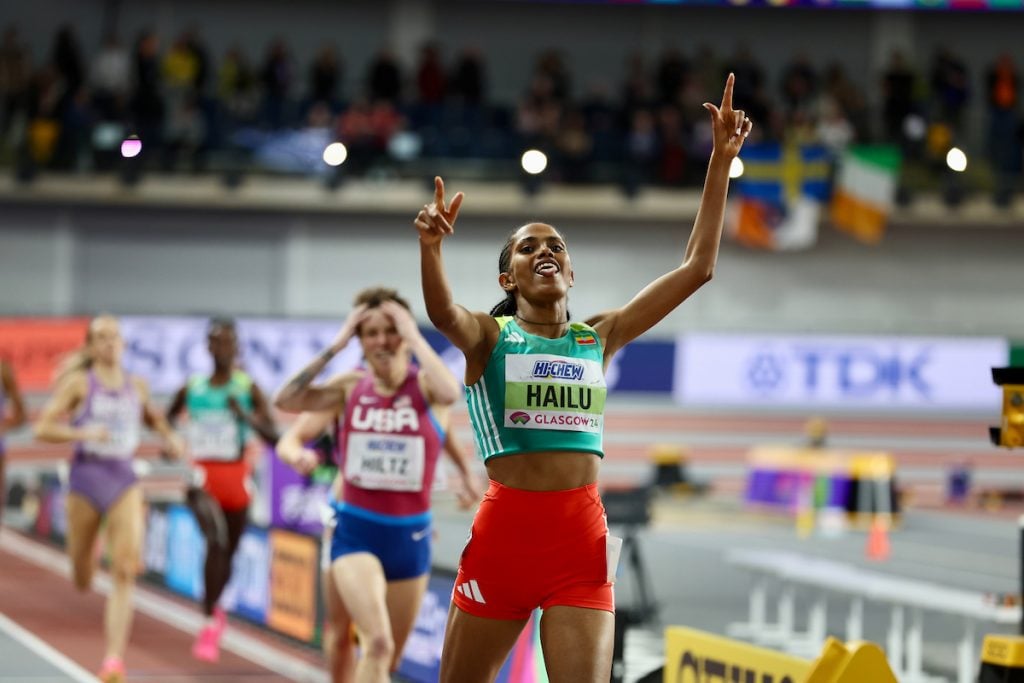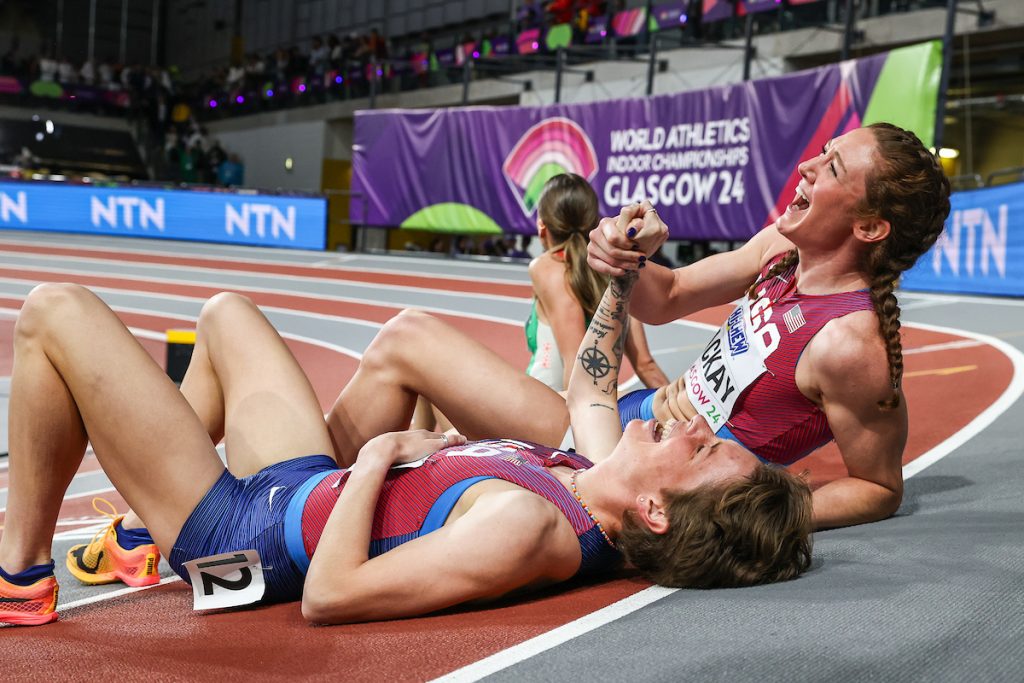2024 World Indoors W1500: Freweyni Hailu Wins Gold As Americans Hiltz & Mackay Go 2-3
These were the first US medals in the event since Regina Jacobs in 2003
By Robert JohnsonGLASGOW, Scotland – Ethiopia’s Freweyni Hailu, the fastest 1500m woman in the world in 2024 who won world indoor silver at 800 in 2022, lived up to her favorite status in the women’s 1500 tonight by winning in 4:01.46. She had to overcome a bold challenge from American Emily Mackay, who made her bid for glory by going from 7th to 1st between 1k and 1100 and breaking the race open.
In the end, Hailu ran down Mackay, who at one point led by more than five meters, and caught her with 100 meters to go. US champ Nikki Hiltz’s fantastic 2024 campaign continued as Hiltz earned their (Hiltz is prefers the they/them pronouns) first global medal with silver in 4:02.32, after Hiltz ran Mackay down in the finishing straight. Mackay hung on for the bronze in 4:02.68.
Britain’s Georgia Bell’s remarkable return to the sport continued to gain steam as she was 4th in 4:03.47 as Diribe Welteji, the 2nd fastest woman in the world in 2024 and 2023 world outdoor silver medalist, was a disappointing 5th in 4:03.82.
Race video, results and full analysis appear below.
(if you need a VPN to watch click here)
| PLACE | NAME | BIRTH DATE | NAT. | MARK |
|---|---|---|---|---|
| 1. | Freweyni HAILU | 12 FEB 2001 | ETH | 4:01.46 |
| 2. | Nikki HILTZ | 23 OCT 1994 | USA | 4:02.32 |
| 3. | Emily MACKAY | 30 APR 1998 | USA | 4:02.69 |
| 4. | Georgia BELL | 17 OCT 1993 | GBR | 4:03.47 |
| 5. | Diribe WELTEJI | 13 MAY 2002 | ETH | 4:03.82 |
| 6. | Revee WALCOTT-NOLAN | 06 MAR 1995 | GBR | 4:04.60 |
| 7. | Agathe GUILLEMOT | 11 JUL 1999 | FRA | 4:04.94 |
| 8. | Salomé AFONSO | 19 NOV 1997 | POR | 4:06.18 |
| 9. | Birke HAYLOM | 06 JAN 2006 | ETH | 4:06.27 |
| 10. | Maia RAMSDEN | 23 MAR 2002 | NZL | 4:06.88 |
| 11. | Lucia STAFFORD | 17 AUG 1998 | CAN | 4:08.90 |
| 12. | Esther GUERRERO | 07 FEB 1990 | ESP | 4:12.33 |
Quick Take: This race was a tactical disaster for the Ethiopians
One thing many Ethiopian runners seem to struggle with is non-paced races. That makes sense as unlike other track powers like Kenya, Jamaica or the US, Ethiopia rarely runs Olympic/Worlds trials races – they normally pick their teams off of seasonal best times. But their lack of tactical prowess showed tonight and really helped the Americans.
Coming into World Indoors, the question was would anyone be able to break up the three Ethiopian entrants who topped the entrants lists in terms of seasonal best times or would they sweep the medals for the second straight World Indoors
After the first round, a 1-2 finish looked possible as the two fastest women in the world in 2024 in Hailu (3:55.28 sb) and Welteji (3:55.47 sb) each won a heat. But Birke Haylom, the world junior record holder (3:54.93 outdoors last year, 3:58.43 indoors this year) who just turned 18 in January, looked a little shaky. It seemed like the bronze medal might be in play for the rest of the field, and both of the Americans would have a great shot at it.
In the end, both Americans medalled, helped out in part by some really poor tactical decisions by the Ethiopians.
At the start of the race, Hailu needlessly slammed the pace down 100 meters into the race, running her second 100 in 14.74 to hit 200 in 30.83. She’d hit 400 in 62.89 – which is 3:55.8 pace which isn’t crazy. But by 800 the time was just 2:11.84. The whole time she was followed closely by Welteji. That’s a really stupid way to run 2:11. Contrast that to the Americans, who ran their first 400 in 64.45 and 64.47.
The third Ethiopian, the teenager Haylom who ended up 9th 4:06.27, ran the first 100 in last place. But then she made a mad dash to move to the front and get with her compatriots, running her next 400 in 63.23 to grab the lead by 500.
We can understand why the Ethiopians would want an honest pace. But many runners don’t have a great sense of pace and aren’t used to leading. If you want an honest race, it’s way better to go out a little conservative and squeeze things down than it is to go out fast and slam on the brakes as you don’t waste a ton of energy.
We didn’t get a chance to talk to the Ethiopians after the race. It’s likely they were all planning on taking a crack at the leading but just did a poor job of executing it. Hailu was looking over her shoulder after 400 and then Haylom took over until 800 when Welteji led briefly, but the problem is the pace was lagging and everyone else got back in it.
Quick Take: Hiltz went into the meet “manifesting bronze,” woke up with a sore throat on race day…and came away with silver
Hiltz has a strong kick and felt coming in that a bronze medal was attainable, a belief that became stronger after seeing all the American success of the last three days. But Hiltz’s belief was shaken a little after waking up on Sunday morning with a sore throat. Hiltz then went back to bed and rested up ahead of the final, which was the last race of the championships at 9:45 p.m.
“I literally slept all day long, I woke up and it feels like the morning right now,” Hiltz said after the race.
Given the illness, Hiltz’s coach Mike Smith told Hiltz they might not have as many gears available to use during the race and to be patient and purposeful when making a move.
“[He said] I think you’re just going to have one bullet, so use it wisely,” Hiltz said. “I used it that last 100m.”
Quick Take: Emily Mackay made a huge move with 400 to go and was rewarded for it
Going into this meet, nobody would have expected Mackay, the US runner-up, to have a four-meter lead on the field at the bell. But Mackay, a Binghamton grad who runs for New Balance Boston under coach Mark Coogan, is very confident in her fitness right now and raced fearlessly in Glasgow. Mackay was feeling good with 400 to go, so she took off and opened a gap after splitting 30.28 for her penultimate lap. Mackay would hold that pace for the last lap (30.33 for a 60.61 final 400) but that was not enough to hold off the fast-closing Hailu and Hiltz.
Still, this was a terrific run for Mackay, whose best NCAA finish was 6th, in her first global championship and proof that the breakthrough she made last summer, when she ran 3:59 in her first year as a pro, was for real.
Quick Take: Georgia Bell is 4th in the world while working a full-time job in cybersecruity software and being no good in college
Bell’s story is wild. She flashed early talent, running 2:09 for 800 at age 14, but didn’t do much after that. She headed Cal for NCAA action, but never even made a Pac-12 final, let alone an NCAA final, when she competed there from 2015-2017. She then took almost four years off from the sport before dipping her toes back into it during the COVID lockdown.
At the beginning of last summer, she had a 4:16 1500 pb. Now she’s 4th in the world and is training with Trevor Painter (Keely Hodgkinson’s coach). Bell is leaving Glasgow at 6:30 a.m. on Monday as she has go to work at her real job in cybersecurity.
Talk about the race and World Indoors on our world-famous fan forum / messageboard.
- Geordie Beamish – from 8th to 1st – in the last 200 of an INDOOR WORLD FINAL. Gold for New Zealand!
- Nordaas: «Im better than Beamish», blames organizer for chaotic race
- Nikki MF Hiltz SILVER
- USA FOUR MEDALS IN THE 1,500
- Final Day of Worlds – Official 2024 World Indoors Day 3 Discussion Thread + Live Recap Show at 8 pm ET
- Bryce MF Hoppel wins 2024 world indoor gold
- Thoughts on Devynne Charlton WR seemingly out of nowhere?
- Noah Lyles to Fred Kerley: “I mean, he could be here, but he ain’t. So be mad at that. Come on out here.”
- Will Hocker’s world title have an asterisk next to it?
- Miltiadis Tentoglou blasts World Athletics and says athletes are not respected
- What was Pietro Arese saying to Josh Kerr after the 3k?


